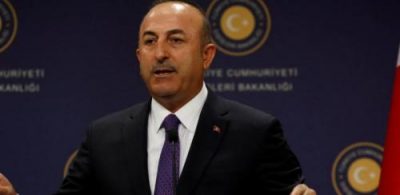Will Turkey Leave NATO? “You Can’t Control Us” – Turkey Threatens to Retaliate if US Blocks Sale of 116 F-35s

Featured image: Turkish Prime Minister Mevlut Cavusoglu
In the latest sign that Turkey is seriously considering leaving NATO as its relationship with the security bloc (and the US in particular) continues to deteriorate, Turkish Prime Minister Mevlut Cavusoglu warned on Thursday that the country would retaliate if a bill being pushed by House Republicans to block arms sales to Turkey becomes law.
As Reuters reports, lawmakers released details on Friday of a $717 billion annual defense policy bill that included a provision to temporarily halt weapons sales to Turkey. During an interview with broadcaster CNN Turk, Cavusoglu criticized the measure, saying it was wrong to impose such a restriction on a military ally, alluding to the fact that Turkey has graciously allowed the US to use its Encirlik air base to launch its air strikes against ISIS (as well as against Turkey’s enemy the Syrian regime of Bashar al-Assad).
“If the United States imposes sanctions on us or takes such a step, Turkey will absolutely retaliate,” Cavusoglu said. “What needs to be done is the U.S. needs to let go of this.”
While still a ways away from becoming law (and its unclear if President Trump, who has publicly praised Turkish President Recep Tayyip Erdogan) the proposed US National Defense Authorization Act would block sales of “major” arms to Turkey until a report on the relationship between the US and Turkey (which is also a component of the law) is completed by the Pentagon.
The implied target of the bill would be the 116 F-35 Lightning II fighters that Washington has promised to sell Ankara, of which 100 are almost ready to be delivered.
The bill is in many ways a response to Turkey’s recent purchase of S-400 air defense systems from Russia. Though Turkey’s relationship with Russia is still far from amicable (indeed, the two countries almost became embroiled in a military confrontation after Turkey shot down a Russian jet that was allegedly flying through its airspace back in 2015), the purchase has unnerved NATO and the US. The Russian weapons, Reuters notes, aren’t compatible with NATO’s defense systems.
Secretary of State Mike Pompeo told Cavusoglu last month that the US was “seriously concerned” about Turkey’s buying of the S-400s (of course, we imagine American defense contractors weren’t thrilled either).
Cavusoglu criticized NATO’s consternation over the sale of Russian arms and accused it of trying to control Turkey and infringing on its sovereignty.
“Turkey is not a country under your orders, it is an independent country… Speaking to such a country from above, dictating what it can and cannot buy, is not a correct approach and does not fit our alliance,” he said.
Despite Trump’s warm feelings toward Erdogan, the Turkish president’s recent visits to the US have only served to inflame the conflict as his body guards repeatedly attacked Kurdish protesters that showed up to confront Erdogan during a trip to the home of the Turkish ambassador outside Washington DC and during a speech he gave in New York City while he was attending a session of the UN General Assembly. The beatings elicited charges against one of Erdogan’s body guards and a Turkish national living in New Jersey.
Last year, both countries temporarily curtailed embassy processing of visas after Turkey arrested an employee of the Turkish consulate in Istanbul as tensions flared.
Turkey leaving NATO would only be the latest sign that the Cold War alliance has entered a state of collapse as President Trump has repeatedly criticized it and castigated most of its members for not paying their fair share for their defense.
Of course, we doubt the bill will be successful – as it stands, it appears to be merely a threat by hawkish Republicans in the House. But if Turkey does eventually leave NATO, would that too be Russian President Vladimir Putin’s fault?

